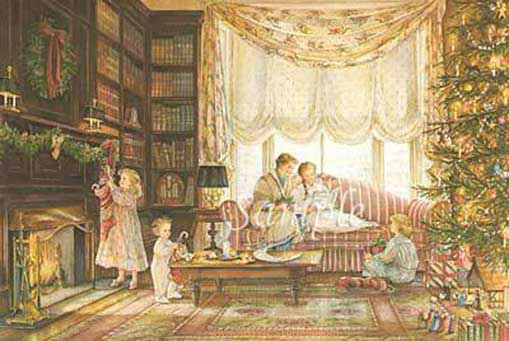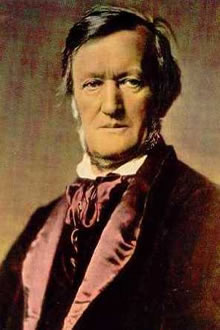當(dāng)前位置: Language Tips> 合作專區(qū)> 英語學(xué)習(xí)專欄
分享到

|
Christmas Eve, 1870. Richard Wagner and his wife, Cosima, had agreed not to give each other Christmas presents. They were simply too poor. But Wagner was planning a surprise gift. For more than two months he had been crafting a piece of music to be performed outside Cosima’s bedroom door on Christmas morning. He had based it on themes later to be used in his opera Siegfried, plus a little nursery song he had written for their children two years earlier. He completed the Siegfried Idyll three weeks before Christmas and arranged for conductor Hans Richter to recruit the members of the small orchestra. Richter conducted secret rehearsals, first in Zurich then at a hotel in Lucerne. Wagner invited philosopher Friedrich Nietzsche to the final rehearsal on Christmas Eve at the Hotel du Lac and they arrived together at the Wagners’ home in the village of Trihschen. There they found Cosima decorating the Christmas tree and preparing presents for the children. At seven o’clock on Christmas morning the musicians arrived and quietly arranged themselves on the stairs outside Cosima’s room. They began to play. “As I awoke to the light of dawn,” Cosima said later, “my mind passed from one dream into another. Familiar sounds from Siegfried came to my ears. It was as if the house—or more accurately—our entire being, was rising up in music and going up to heaven. Sacred memories, birdsong and sunrise, interwoven with music from Siegfried, soothed my heart and I came to realize that I was not dreaming, and yet was experiencing the most sublime of all dreams. Now at last I understood all of Richard's writing in secret.” And yet Wagner had kept his pledge not to buy his wife a Christmas present. December 25th was Cosima’s birthday. |
1870年圣誕夜,理查德?瓦格納和他的妻子柯西瑪說好了不互送禮物——他們實在是太窮了。但瓦格納還是謀劃著一個意外的禮物。 兩個多月來,瓦格納一直在創(chuàng)作一首樂曲,準(zhǔn)備圣誕節(jié)那天早晨在柯西瑪?shù)呐P室外彈奏。他的曲子取材于他后來的歌劇《齊格費里德》的主旋律,另外加入一首兩年前他寫給孩子們的小童謠。在圣誕節(jié)前,瓦格納寫完了《齊格費里德田園曲》,就安排指揮家漢斯?里切斯特在一小型管弦樂團里選錄演員。里切斯特秘密地排練了幾場,先在蘇黎世,后來在盧塞恩的一家旅館。 平安夜,在杜拉奇酒店的最后一次排練時,瓦格納把哲學(xué)家弗里德里希?尼采請了過來,隨后他們一起到達瓦格納位于萃斯琴村的家。在那里,他們看見柯西瑪正在裝飾圣誕樹,為孩子們準(zhǔn)備禮物呢。 圣誕節(jié)早晨七點,樂師們來了。他們悄悄地在柯西瑪屋子外的樓梯上排好,然后開始演奏起來。 “當(dāng)我從晨光里醒來,” 柯西瑪后來回憶說,“一個夢又一個夢從我腦子里掠過。忽然,熟悉的《齊格費里德》樂曲傳入耳畔。當(dāng)時,就好像整個房子——或更確切地說——所有的一切都和音樂一起跳躍起來,飄上了天堂。神圣的記憶、鳥鳴、日出等等都和《齊格費里德》的音樂交織融合在一起了。我深感安慰,開始意識到,我沒有做夢,卻享受到了最美妙的夢境。現(xiàn)在,我終于明白瓦格納的創(chuàng)作秘密了。” 然而瓦格納還是遵守了不給他妻子買圣誕禮物的諾言,因為12月25日,還是柯西瑪?shù)纳漳亍?/p> (來源:英語學(xué)習(xí)雜志 編輯:丹妮) |
注:Richard Wagner: 理查德?瓦格納(1813~1883),德國著名作曲家、指揮家。主要作品:歌劇《尼伯龍根的指環(huán)》、《帕西法爾》等11部,9首序曲、1部交響樂、4部鋼琴奏鳴曲及大量合唱曲、藝術(shù)歌曲等,著作《藝術(shù)與革命》、《歌劇與戲劇》等。

上一篇 : 一無所知,如何教女?
下一篇 : 圣誕老人確有其人嗎?
分享到
關(guān)注和訂閱


翻譯
關(guān)于我們 | 聯(lián)系方式 | 招聘信息
電話:8610-84883645
傳真:8610-84883500
Email: languagetips@chinadaily.com.cn